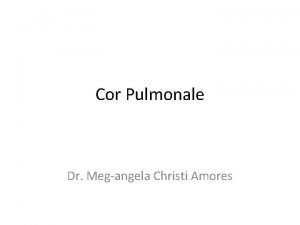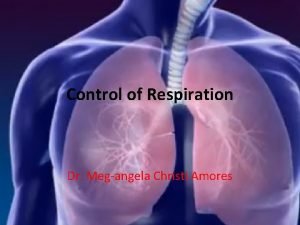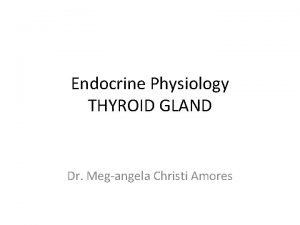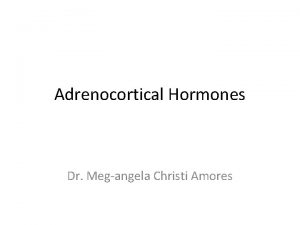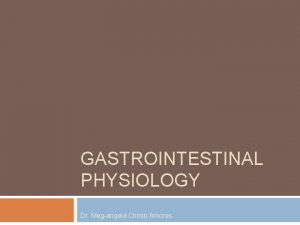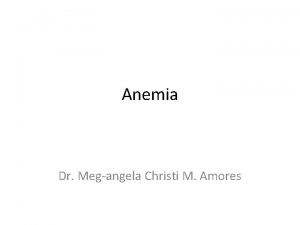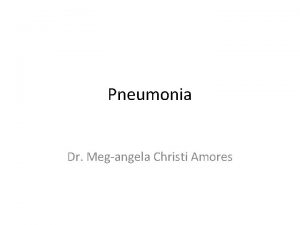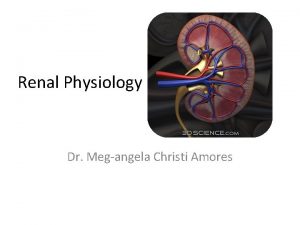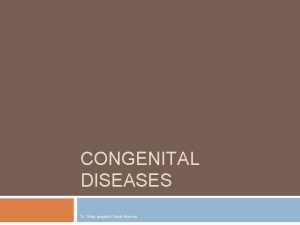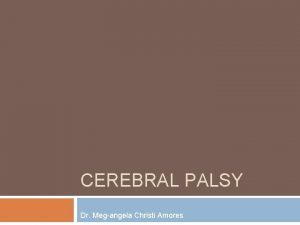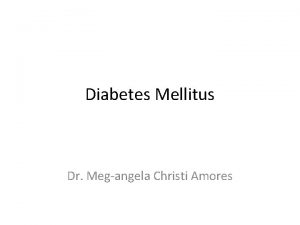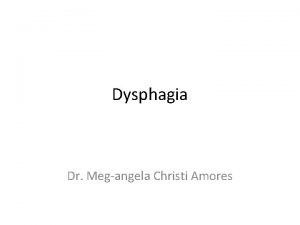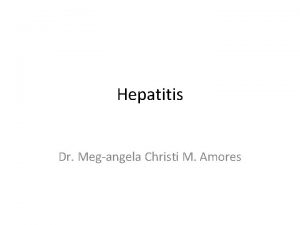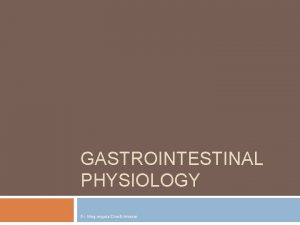Cirrhosis Dr Megangela Christi M Amores Cirrhosis a



















- Slides: 19

Cirrhosis Dr. Meg-angela Christi M. Amores

Cirrhosis • a histopathologically defined condition – pathologic features consist of the development of fibrosis to the point that there is architectural distortion with the formation of regenerative nodules • Decreased mass and function


Alcoholic Cirrhosis • Excessive alcohol use can lead to development of: • alcoholic fatty liver • alcoholic hepatitis • alcoholic cirrhosis • Chronic alcohol use can produce fibrosis in the absence of accompanying inflammation

Alcoholic Cirrhosis • Pathogenesis: – Alcohol is the most commonly used drug in US – Ethanol is mainly absorbed by the small intestine – Three enzyme systems account for metabolism of alcohol in the liver – majority of ethanol oxidation occurs via ADH to form acetaldehyde – acetaldehyde-mediated hepatocyte damage – Hepatocyte loss occurs, and with increased collagen production and deposition – liver contracts and shrinks in size

Alcoholic Cirrhosis • Clinical Features: – requires an accurate history regarding both amount and duration of alcohol consumption – nonspecific symptoms such as vague right upper quadrant pain, fever, nausea and vomiting, diarrhea, anorexia, and malaise – more specific complications of chronic liver disease, including ascites, edema, or upper gastrointestinal (GI) hemorrhage – jaundice or encephalopathy

Alcoholic Cirrhosis • Physical Exam: – Hepatomegaly, splenomegaly – scleral icterus, palmar erythema, spider angiomas, parotid gland enlargement, digital clubbing, muscle wasting, or the development of edema and ascites – Men: decreased body hair and gynecomastia – Women: menstrual irregularities


Alcoholic Cirrhosis • Lab tests: – may be completely normal – early cirrhosis – advanced liver disease: • • Anemia Serum total bilirubin can be normal or elevated Prothrombin times are often prolonged aminotransferases (ALT, AST) are typically elevated

Alcoholic Cirrhosis • Diagnosis: – HISTORY AND PE – Liver biopsy can be helpful to confirm a diagnosis but witheld until abstinence has been maintained for at least 6 months

Alcoholic Cirrhosis • Treatment: – ABSTINENCE - cornerstone of therapy – good nutrition and long-term medical supervision – Glucocorticoids – if no infection – Acetaminophen use is often discouraged

Cirrhosis due to Hep B and Hep C • hepatitis C virus (HCV) – approximately 80% develop chronic hepatitis C – and of those, about 20– 30% will develop cirrhosis over 20– 30 years – liver is small and shrunken with characteristic features of a mixed micro- and macronodular cirrhosis – inflammatory infiltrate is found in portal areas

Cirrhosis due to Hep B and Hep C • hepatitis B – about 5% develop chronic hepatitis B – and about 20% of those patients will go on to develop cirrhosis – ENDEMIC in southeast asia • up to 15% of the population may be infected having acquired the infection vertically at the time of birth

Cirrhosis due to Hep B and Hep C • CLINICAL FEATURES – can present with the usual symptoms and signs of chronic liver disease – Fatigue, malaise, vague right upper quadrant pain, and laboratory abnormalities – including quantitative HCV RNA testing and analysis for HCV genotype – hepatitis B serologies to include HBs. Ag, anti-HBs, HBe. Ag (hepatitis B e antigen), anti-HBe, and quantitative HBV DNA levels

Cirrhosis due to Hep B and Hep C • TREATMENT – Management of complications – beneficial effects of antiviral therapy – chr Hep B – Treatment of patients with cirrhosis due to hepatitis C is a little more difficult because the side effects of pegylated interferon and ribavirin – if it is successful, the benefit is great and disease progression is reduced

Cardiac Cirrhosis • Definition – long-standing right-sided congestive heart failure may develop chronic liver injury and cardiac cirrhosis

Cardiac Cirrhosis • Pathogenesis: – elevated venous pressure transmitted via the inferior vena cava and hepatic veins to the sinusoids of the liver – become dilated and engorged with blood – liver becomes enlarged and swollen, and with long -term passive congestion and relative ischemia due to poor circulation – become necrotic, leading to pericentral fibrosis

Cardiac Cirrhosis • Diagnosis – diagnosis is usually made in someone with clearcut cardiac disease who has an elevated ALP and an enlarged liver

Major Complications
 Esta semana en amores
Esta semana en amores Ei ardoca
Ei ardoca Amor sensual y terrenal ejemplos
Amor sensual y terrenal ejemplos Marina amores
Marina amores A la vendimia niña de mis amores letra
A la vendimia niña de mis amores letra Pregonadas son las guerras
Pregonadas son las guerras “obras son amores, que no buenas razones.”
“obras son amores, que no buenas razones.” Existem 3 amores na vida
Existem 3 amores na vida Puerto rico patria mia la tierra de mis amores
Puerto rico patria mia la tierra de mis amores Hola hola mis amores
Hola hola mis amores Amores definition
Amores definition Hola amores
Hola amores Amanda garrick
Amanda garrick Esta semana en amores
Esta semana en amores Ilha dos amores lusiadas
Ilha dos amores lusiadas Puerto rico patria mia la tierra de mis amores
Puerto rico patria mia la tierra de mis amores Asrix
Asrix Importancia de la eucaristia
Importancia de la eucaristia Hak orang beriman
Hak orang beriman Spanish missions in texas map
Spanish missions in texas map










